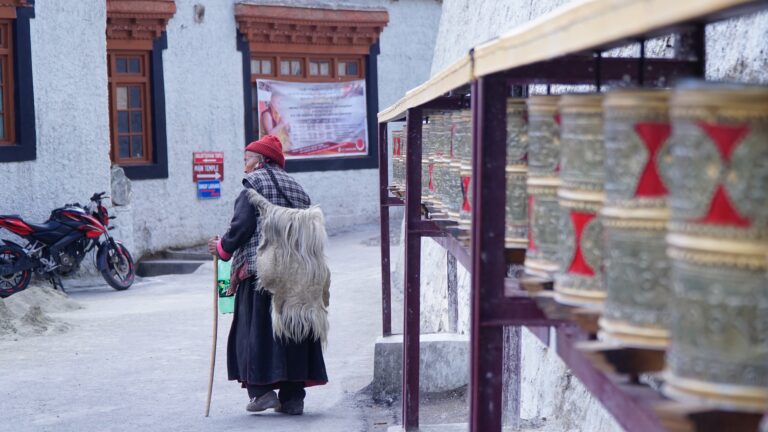The State of Ladakh lies in the extreme north of India on the border of China. Elevated at a mighty 14,700 altitude above sea, the region of Ladakh has three main alpine lakes namely Tso Moriri, Pangong Tso and Tso Kar which are all natural glacial lakes and features of the region. ‘Tso’ literally means ‘Lake’ in the Ladakhi-Tibetan language. These are all salt water lakes on the Rupshu and Changthang plains. They seep into swamps and soils of the area while retaining water, ultimately as a resource to the ecology. There are numerous picturesque and easy to reach lakes in Ladakh but for us, the Tso Kar Lake, in particular, is one of the most popular area to visit. Also known as the ‘white lake’, Tso Kar is situated in the Rupshu valley which is in southern Ladakh. The wildlife surrounding this waterbody like foxes, wolves, Kiangs, gazelles, yaks, and horses can be seen during visits. It is a sweet spot for birdwatching with birds like geese, grebes, brown-headed gulls, terns, ruddy sheldrakes, black-necked cranes and orange Brahminy ducks. At one of the highest plateaus in the world, these flightful creatures find solace and shelter to rest, breed, and nurture their young ones. The Tso Kar acts as a refuge and resting space for migrating birds in the extreme climates. The fauna here is limited to stoneworts, lake weeds, nettles during the summers but are very appeasing. This lake is popular for early salt production as salt mined here used to be exported to Tibet by the Changpas.
Let me tell you about the fascinating history behind the Tso Kar Lake. Salt is an important part of Ladakh’s culture. The region has produced some of the finest and ancient rock salt from many hundred years. It has been mined in a very systematic and scientific way. Every vein has been looked into and verified before digging the actual mines. The reserves are quite huge as compared to other parts of Ladakh which make the region very strategic.

The lake is surrounded by tents which reside the Nomadic community of Samad-Rokchen though their main station is a village called Thukje only three kilometres from the lake.
Here the salt called sweet salt or glacial salt is produced. The Tibetan cuisine really regards salt as crucial. For Tibetans who chose to settle in India, it is a reminiscent of their land, yearning for a piece of home and for the people of Ladakh it is an indispensible part of their culture. According to the people of Ladakh, the salt is sweet tasting and delicious and many tourists fail to say otherwise. The Ladakhis are the custodians of this tradition of salt production and the main part of their traditional culture is devoted to its preservation. It was formerly used to preserve various kinds of food items, leather and iron from desiccation. Ladakh has one of the highest altitude salt lakes in the world which are used to cultivate this salt. Now, salt is used in almost every dish in Ladakhi households and remains a key ingredient to season and highlight the simple, hearty and scrumptious food of the region. Highlighted by the sweet salt is the infamous Po Cha also known as Butter tea of Ladakh and other Tibetan-Himalayan regions. The tea resembles masala chai so much that the first sip of the first tasting could almost shock you since unexpected salty broth is what you taste instead of sweet milky tea. But after getting used to the saltiness, one can really appreciate the rich and warming liquid great for the drying cold desert of Ladakh.
If you request for po cha in any hotels of Ladakh, you will surely be presented with a hearty cup of this steaming liquid.
The Tso Kar Lake is situated about 135 kilometres away from the capital city of Leh and it takes about three hours to commute. It is surrounded by lush green meadows and is a serene spot for some peaceful self-reflection.
Visiting Ladakh is a dream for many, experiencing the culture, high lands, adventure sports, cold desert sand under their feet, and eating the homely food, all check marks on our bucket lists. Hotels in Ladakh like Stok Palace Luxury Hotel bring it all together along with a royal perspective of the historic region of Ladakh. Visit the saline lakes and experience Ladakh like a local savouring the sweet flavour of the Ladakhi salt!

